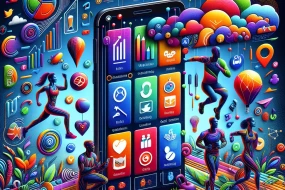
In today's fast-paced world, staying fit and healthy is more crucial than ever. With the advent of technology, tracking your fitness journey has become as simple as tapping on your smartphone. Whether you're a fitness enthusiast or just starting your wellness journey, having the right fitness tracker app can make all the difference. In this article, we'll dive into some of the top fitness tracker apps available for Android and iOS, exploring their features, benefits, and potential drawbacks. Let's lace up our virtual sneakers and get started!
Why Fitness Tracker Apps Matter
Fitness tracker apps have revolutionized the way we approach health and wellness. They provide real-time data, personalized insights, and motivation to help users reach their fitness goals. Imagine having a personal trainer, a nutritionist, and a health coach all in one app. That's the power of these digital tools. However, not all apps are created equal, and choosing the right one can be daunting. We'll explore some top contenders to help you make an informed decision.
MyFitnessPal: Your Personal Nutritionist
MyFitnessPal is a veteran in the fitness app space, known for its extensive food database and user-friendly interface. This app is particularly beneficial for those who want to monitor their calorie intake and manage their diet effectively. With features like barcode scanning and meal logging, tracking your daily nutrition becomes a breeze. However, some users find the premium subscription a bit pricey, though it offers advanced features like macronutrient tracking and exclusive content.
Fitbit App: Beyond Just Steps
The Fitbit app is synonymous with step tracking, but it offers so much more. From heart rate monitoring to sleep analysis, this app provides a comprehensive view of your health. Users with a Fitbit device can sync their data seamlessly, but even without one, the app offers a wealth of features. One common mistake is underestimating the importance of sleep tracking, which is crucial for overall health. The Fitbit app excels in this area, providing insights that can help improve your sleep quality.
Strava: For the Competitive Spirit
If you're a runner or cyclist, Strava is the app for you. Known for its social networking features, Strava allows users to connect, compete, and share their achievements. The app's segment feature lets users compare their performance on specific routes, adding a competitive edge to your workouts. However, it's essential to ensure your privacy settings are optimized, as sharing your location data can pose security risks.
Google Fit: Simplicity Meets Functionality
Google Fit offers a clean, straightforward interface that's perfect for beginners. It integrates seamlessly with other health apps and devices, providing a holistic view of your fitness. One standout feature is the Heart Points and Move Minutes, which encourage users to engage in activities that elevate their heart rate. While it may not have the advanced analytics of some other apps, its simplicity and integration capabilities make it a strong contender.
Apple Health: The Ecosystem Advantage
For iOS users, Apple Health is a powerhouse. It serves as a central hub for all your health data, integrating with a wide range of apps and devices. The app's ability to consolidate data from various sources provides users with a comprehensive health overview. One common oversight is not customizing the dashboard to display the most relevant metrics, which can enhance the app's usability.
Common Mistakes to Avoid When Using Fitness Apps
While fitness tracker apps can be incredibly beneficial, there are pitfalls to watch out for.
1) Over-reliance on technology: Remember, apps are tools, not solutions.
2) Ignoring privacy settings: Always review what data you're sharing.
3) Setting unrealistic goals: Start small to avoid burnout.
4) Neglecting app updates: Developers often fix bugs and improve features.
5) Not customizing app settings: Tailor the app to suit your needs for the best experience.
Choosing the Right App for You
Selecting the right fitness tracker app depends on your goals, lifestyle, and preferences. Do you prefer a community-driven experience, or are you more interested in detailed analytics? Consider what motivates you and choose an app that aligns with those factors. Remember, the best app is one that you'll consistently use, so prioritize ease of use and compatibility with your daily routine.






























